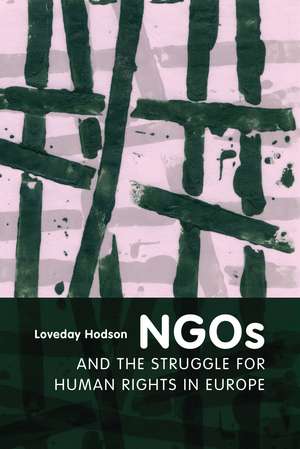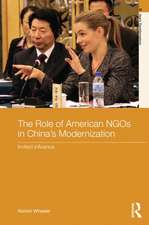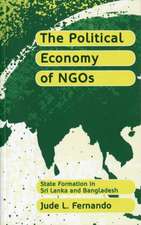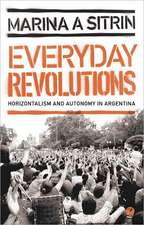NGOs and the Struggle for Human Rights in Europe
Autor Loveday Hodsonen Limba Engleză Hardback – 27 ian 2011
Preț: 497.89 lei
Preț vechi: 559.43 lei
-11% Nou
95.29€ • 99.22$ • 80.53£
Carte tipărită la comandă
Livrare economică 10-24 martie
Specificații
ISBN-10: 1841139610
Pagini: 222
Dimensiuni: 156 x 234 x 17 mm
Greutate: 0.5 kg
Editura: Bloomsbury Publishing
Colecția Hart Publishing
Locul publicării:London, United Kingdom
Notă biografică
Loveday Hodson is a Lecturer in Law at Leicester University.
Cuprins
1 INTRODUCTION I. The Struggle for Rights II. The Struggle for Rights and the European Convention on Human Rights III. Vocabulary and Classification IV. Chapter Synopsis 2 THE LIMITS OF INDIVIDUALISM: NGOs AND THE EUROPEAN CONVENTION ON HUMAN RIGHTS I. Introduction II. Individualism and the European Convention on Human Rights III. The Politics of Human Rights Litigation IV. NGOs and the International Human Rights Movement V. Beyond Individualism: A Fresh Approach to the European Convention on Human Rights VI. Conclusion 3 THE ROLE OF NGOs IN ECHR LITIGATION I. Introduction II. The Current Literature on NGOs and the ECHR III. A Brief Outline of the Adopted Methodology IV. The Incidence of NGO Involvement in the Sample Cases V. The Type of NGOs Involved in Litigation VI. The Type of Cases in which NGOs are Involved VII. The Success-Rate of NGO cases VIII. Conclusion 4 STATES OF IMPUNITY: THE ROLE OF NGOS IN ADDRESSING GROSS AND SYSTEMATIC VIOLATIONS OF THE CONVENTION I. Introduction II. The European Roma Rights Centre: Challenging Police Brutality Against the Roma III. The Kurdish Human Rights Project: Addressing Gross Human Rights Violations Against Turkish Kurds IV. Understanding the Involvement of NGOs in the Case Studies V. Recent Developments VI. Conclusion 5 'THE FIGHT THAT IS NEVER DONE': THE ROLE OF 'PURE HUMAN RIGHTS' ORGANISATIONS I. Introduction II. The AIRE Centre III. Liberty: Challenging Criminal Justice Reforms IV. Recent Developments V. Conclusion 6 'A DESIRE THAT NEVER ENDS': PRESSURE GROUPS AND THE EUROPEAN CONVENTION ON HUMAN RIGHTS I. Introduction II. 'PESUE' and the Right to Family Life III. Stonewall: Lobbying for Gay Rights IV. Greenpeace and Environmental Rights V. Recent Developments VI. Conclusion 7 CONCLUSION I. Introduction II. The Research Findings III. The Limitations of NGOs as Litigators IV. Concluding Observations APPENDIX A DETAILED DESCRIPTION OF THE ADOPTED METHODOLOGY I. Introduction II. The Aims and Scope of the Research Project III. The Sample Analysed IV. The Quantitative Stage: Identifying NGO Participation V. The Qualitative Stage: Understanding NGO Participation VI. Final Observations
Recenzii
Descriere
This publication provides a fresh perspective on the litigation of the European Court of Human Rights by focusing upon the role that non-governmental organisations play in it. The inspiration for this work was the growing literature that points to human rights as the outcome of political and social struggles. The role that NGOs play in these struggles is well-documented in the context of other international and regional human rights tribunals, but has been less widely written about in the context of the European Court of Human Rights. The Court is typically subject to legalistic, as opposed to socio-political, scrutiny. In this book the Court's litigation is re-cast as a site where politically motivated actors attempt to impact upon the meaning that is given to the language of the European Convention on Human Rights and to use the Convention as a mechanism that can contribute to social change.For the purposes of this research a mixture of quantitative and qualitative research techniques are adopted. These methods facilitate the author's desire to obtain both a de-centred perspective on the Court's functions and a systematic picture of the scale of NGO involvement in the Court's litigation. The core of this work is primarily based on data obtained from a sample of cases in which the Court had delivered judgment, and a plethora of associated materials, including extensive interviews with NGOs that were involved in those cases. Ultimately, this book challenges the idea that the litigation of the Court is bound to the idea of achieving individual justice and highlights the meaningful impact that NGOs have on certain important sections of the Court's litigation.

















